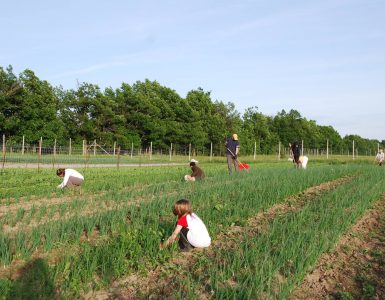Last week, the Government of Ontario dissolved the democratically elected board of a farm organization that negotiates on behalf of vegetable farmers, and by doing so they’ve provoked a growing outcry over fairness.
The Ontario Processing Vegetable Growers (OPVG) represents farmers who grow key crops (including tomatoes, cucumbers, and sweet corn) for canning, freezing or pickling. The OPVG negotiates collective contracts between farmers and processing companies.
Organizations like the OPVG are important to make sure that processing vegetable growers aren’t completely at the mercy of a handful of large processing corporations (like Heinz). When an individual farmer has to negotiate with a large company, they rarely get a fair deal. So the OPVG negotiates on behalf of all processing vegetable farmers across Ontario; they use collective bargaining to get farmers a fair price for their produce.
Which is why it’s so troubling that Jeff Leal, Ontario’s Minister of Agriculture, recently sacked the elected farmer board of the OPVG and appointed a “trustee” to act in their place.
Leal said he was concerned that upcoming contracts were not being negotiated fast enough. But many farmers feel that the dissolution of the OPVG board is meant to remove the limited bargaining power that farmers do have, and to let processing corporations run the show.
The government appointee taking over the OPVG’s negotiation process is former NDP agriculture minister Elmer Buchanan, who seems like a reasonable person.
But the government’s track record on the OPVG file is not good. Last year, another government appointee—former Ontario Federation of Agriculture President Geri Kamenz—made headlines when a recording of his private comments about the OPVG were leaked.
In the leaked recording, Kamenz, then head of the Ontario Farm Products Marketing Commission, described himself as a “hit man” for the government, who could do “dirty” work—like stripping the OPVG of its bargaining powers—while allowing government officials to keep their hands clean.
There was an outcry from the agricultural community, and the National Farmers Union and other groups stood up to defend the OPVG. Geri Kamenz resigned in the aftermath, but recent events are reminiscent of that anti-farmer attitude.
This is also part of a troubling trend in Canada of governments undermining the collective bargaining power of farmers. The Harper government famously gutted the Canadian Wheat Board—which negotiated grain prices for farmers—replacing its democratically-elected board with his own appointees before selling its assets to foreign investment companies.
This behaviour undermines farmers in favour of large companies. And it also threatens our food system, our ability to produce food in Canada. Farmers already struggle with skyrocketing land prices, climate change, and the demographic crisis of an aging farm population. How much more stress can our food system take?
We all need to stand up in support of the OPVG’s democratic power, to stand up for a fair and just food system. I hope that the other agricultural marketing boards, the union movement, and eaters in general will speak out against these continued attacks on farmer democracy and collective bargaining rights.
Aric McBay is a farmer and author.
Photo Caption: The OPVG negotiates contracts for many vegetables, including cabbages for pickling. (Photo copyright Andree Thorpe Photography.)







